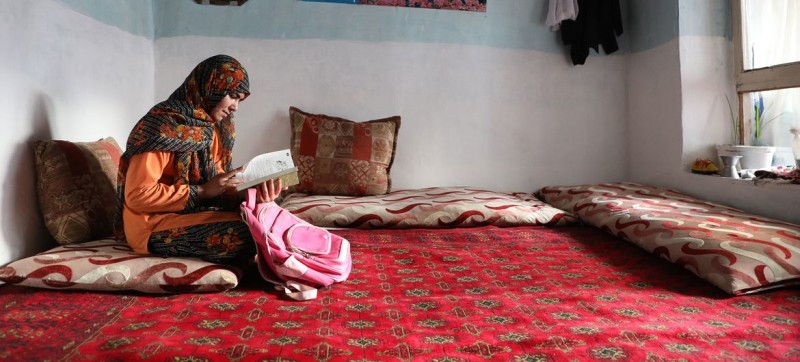© UNICE/Mohammad Haya Burhan A thirteen-year-old girl studies at home in Kabul after the Taliban announced that schools would not reopen for Afghan girls in grades 7-12.
The aim is to reinvigorate international engagement around key issues, such as human rights, in particular women’s and girls’ rights, inclusive governance, countering terrorism and drug trafficking.
“The meeting is intended to achieve a common understanding within the international community on how to engage with the Taliban on these issues,” the UN said in a statement issued on Sunday.
Security Council resolution
The Taliban returned to power in August 2021 and have restricted Afghan women and girls from participating in most areas of public and daily life.
Women nationals have also been barred from working with the UN in a country where nearly 29 million people depend on humanitarian assistance.
Last week, the UN Security Council unanimously adopted a resolution condemning the decision, saying that it undermines human rights and humanitarian principles.
The 15-member body called for the “full, equal, meaningful and safe participation of women and girls in Afghanistan.”
General Assembly President to visit Jordan
The President of the UN General Assembly, Csaba Kőrösi, will conduct an official visit to Jordan, starting on Monday, to spotlight solidarity with Syrian and Palestinian refugees.
More than two million Palestinian refugees live in the country, which is also among those most affected by the Syrian conflict, now in its 12th year.
Mr. Kőrösi will meet with top officials and senior Government leaders to discuss topics of mutual interest, including water sustainability and follow up from the UN Water Conference, held last month in New York.
He will also visit the Zaatari Refugee Camp, the world’s largest camp hosting people who have fled the war in Syria. The Assembly President will be accompanied by representatives from the UN refugee agency, UNHCR, the UN Children’s Fund (UNICEF), the World Food Programme (WFP), and others.
UN deputy chief highlights Africa’s role in multilateralism
UN Deputy Secretary-General Amina Mohammed was in Kenya this past weekend, where she urged African leaders to help shape the future of multilateralism as it struggles to remain relevant.
“The UN, under the leadership of ‘SG’ António Guterres, is here to accompany the best opportunity yet for Africa, which is to lead and bridge the broken trust of multilateralism. And let’s make no mistake about that: that trust is broken,” she said in remarks to the Mo Ibrahim 2023 African Leadership Ceremony held in Nairobi on Friday.
She called for action in the areas of leadership and governance, while urging countries to offer more opportunities to young people and women.
Ms. Mohammed prefaced her remarks by highlighting the crisis in Sudan, expressing deep sadness over the unfolding tragedy while also underlining the UN’s commitment to stay and deliver for the people.




Comments are closed.